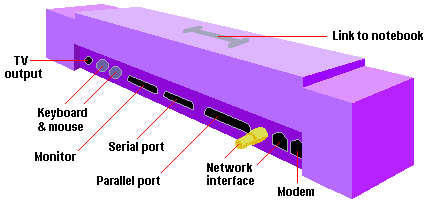Many notebook PCs are proprietary designs, sharing few common, standard parts. A consequence of this is that their expansion potential is often limited and the cost of upgrading them high.
Whilst most will use standard CPUs and RAM, these components are generally fit in unique motherboard designs, housed in unique casing designs. Size precludes the incorporation of items like standard PCI slots or drive bays, or even relatively small features like SIMM slots. Generally the only cheap way to upgrade a notebook is via its native PC Card slots.
A port replicator is not so much an expansion device – but more a means of facilitating easier connectivity between a notebook PC and external peripherals and other devices. The main reason for the existence of port replicators is the fragility of PC connectors – which are designed for only so many insertions. The idea is for the replicator to remain permanently plugged into a desktop PC, and to make the repeated connections often necessary maintain synchronisation between mobile computing devices such as notebooks and PDAs and a desktop PC via the more robust connections provided by the port replicator.

A desk-based docking station takes the concept a stage further – adding desktop PC-like expansion opportunities to mobile computing devices. A full docking station will generally feature expansion slots and drive bays to which ordinary common-or-garden expansion cards and external peripheral devices may be fit. It may also provide additional, higher performance interfaces such as SCSI and come complete with an integrated monitor stand.
- Flat panel displays for mobile computers – laptops, notebooks and netbooks
- Battery technology for mobile computers – laptops, notebooks and webbooks
- Laptop, notebook and netbook expansion devices
- Expansion interfaces for laptops, notebooks and other mobile computers
- DynaSheet
- External keyboards for mobile computers.
- USB On-The-Go – USB technology for PDAs and mobile phones
- Guide to Kensington Slot (K-lock, Kensington Lock, Universal Security Lock) mobile device security